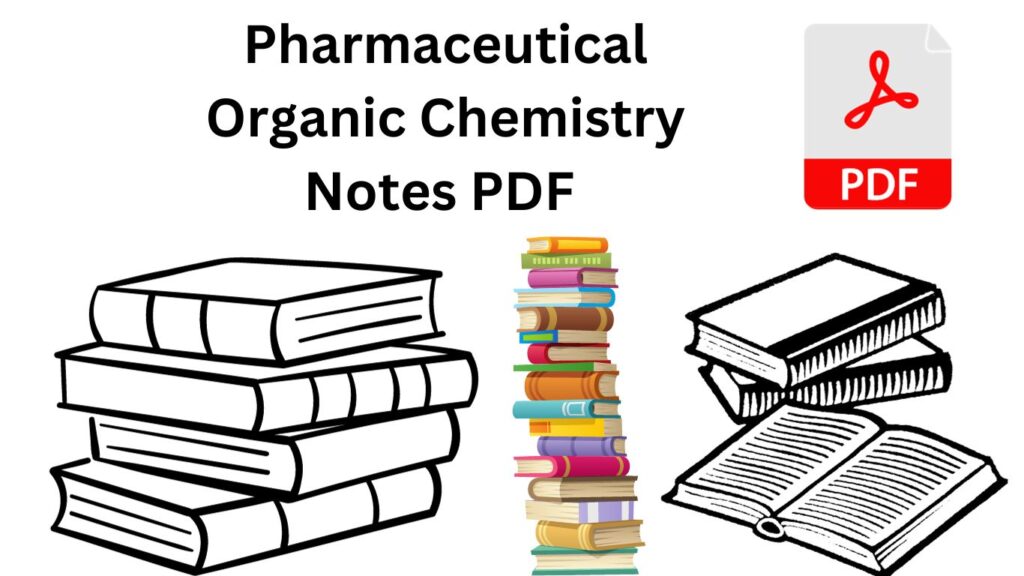Download Pharmaceutical Organic Chemistry 1 Notes PDF| POC Notes PDF:
Pharmaceutical Organic Chemistry 1 is a fundamental course for students pursuing pharmacy and pharmaceutical sciences. In this article, we will delve into the world of pharmaceutical organic chemistry, its importance in the field of pharmacy, key topics covered in the course, and the syllabus to help you understand what you can expect. So, if you’re looking to download Pharmaceutical Organic Chemistry 1 notes in PDF format and gain insights into this subject, you’re in the right place.
How to download POC Notes PDF for free??
Just click on the given link to get PDF. Read the full article for all 5 units.
Unit 1
Download B-pharm 1st year other subject notes PDF. Click here
Download B-pharm POC Syllabus 2023-24. Click Here
Understanding Pharmaceutical Organic Chemistry
Pharmaceutical Organic Chemistry is a branch of chemistry that deals with the study of organic compounds and their applications in the field of pharmacy. It explores the structure, properties, and reactions of various organic compounds, which are the building blocks of life. This field of chemistry plays a pivotal role in drug discovery, development, and formulation, making it an essential part of pharmaceutical education.
Unit 2
Importance of POC Notes PDF in Pharmacy
Organic chemistry is the backbone of pharmaceutical sciences. It equips students with the knowledge and skills needed to understand and manipulate organic molecules, enabling them to develop life-saving drugs, understand drug interactions, and ensure the safety and efficacy of pharmaceutical products. Without a solid foundation in organic chemistry, it would be challenging to excel in the pharmaceutical industry.
Key Topics in POC Notes PDF
Alkanes and Alkenes
The course typically begins with an exploration of alkanes and alkenes, two fundamental classes of organic compounds. Students learn about their structure, nomenclature, and reactions. This knowledge is essential for understanding more complex compounds.
Aromatic Compounds
Aromatic compounds, such as benzene, are another critical topic. Their unique stability and reactivity make them a central focus of pharmaceutical organic chemistry.
Isomerism
Isomerism is the phenomenon where two or more compounds have the same molecular formula but different structures, leading to distinct properties. Understanding isomerism is crucial for drug design and analysis.
Nomenclature
Proper naming of organic compounds is essential to communicate effectively in the field. This section of the course covers the rules and conventions for naming organic compounds.
Unit 3
The Syllabus of Pharmaceutical Organic Chemistry 1
The syllabus for Pharmaceutical Organic Chemistry 1 is divided into several lectures, each covering specific topics.
Lecture 1: Introduction to Organic Chemistry
This lecture provides an overview of the field, its significance in pharmacy, and the basics of organic compounds.
Lecture 2: Structure and Bonding
Understanding the structure and bonding of organic molecules is fundamental to this course.
Lecture 3: Alkanes and Alkenes
Detailed discussions on alkanes and alkenes, including their properties and reactions.
Lecture 4: Aromatic Compounds
In this lecture, aromatic compounds take center stage, with a focus on benzene and its derivatives.
Lecture 5: Isomerism
Exploring isomerism, its types, and implications in pharmaceutical research.
Lecture 6: Nomenclature
A deep dive into naming organic compounds, ensuring clarity and precision in communication.
Unit 4
Applications of Organic Chemistry in Pharmacy
Pharmaceutical organic chemistry has a wide range of applications in pharmacy, including drug design, analysis, formulation, and quality control. It’s the cornerstone of the pharmaceutical industry, ensuring that safe and effective drugs reach the market.
Unit 5
Conclusion
In conclusion, Pharmaceutical Organic Chemistry 1 is a crucial course for anyone aiming for a career in pharmacy and pharmaceutical sciences. Understanding the key topics and syllabus is the first step to excelling in this field. By delving into the world of organic compounds, students gain the knowledge and skills needed to make a real difference in the world of pharmaceuticals.